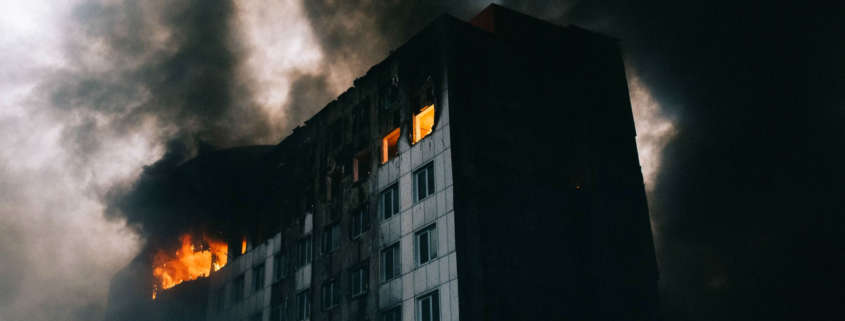A world-shaking event

The terrible events unfolding in Ukraine will be uppermost in all of our minds as we gather for our Synod this morning. Just over two weeks ago Russia invaded Ukraine in what is seen now and will be seen by history as a terrible act of unprovoked aggression. We have witnessed some of the devastating consequences of that invasion in homes and lives and cities destroyed. We have been moved by the courage of the Ukrainian people and their President Zelensky, who addressed the House of Commons by video link on Tuesday. We have wept to see the displacement of the old; the bombing of a maternity hospital; the separation of families; the disruption of an entire European country and a whole continent.
We cry to God for peace. We do not know how to pray or to act but it is clear that these events will reshape Europe and reshape the world in the coming decades. If every gun fell silent today, the consequences of less than three weeks of this terrible war would be felt for generations. Every indication is that the conflict will grow still worse. This is a world-shaking and world-shaping event.
Our thoughts and prayers are with the refugees as we struggle to come to terms with the numbers: two million have fled the country. One million children have been displaced internally or externally. Nearby Poland and Romania and Moldova have responded with immense generosity to Ukrainians fleeing for their lives. The response of the British government has seemed slow and inflexible compared to the response of the European Union. Poland is setting an example to the rest of the world of humanity and welcome to those whose lives have been destroyed, and we must follow it in generosity to those who seek our help.
We can see already that the war will have serious consequences for the United Kingdom, initially in responding to the greatest movement of peoples in Europe since 1945. We will feel the effects of the war in energy, commodity and food prices. The sanctions on Russia are vital but will have their own costs in our economy and place greater stress on lower income households unless there is additional action by government to prevent this. In the medium term we will need a more serious strategy for energy and food security, defence and civil emergencies, which will have its own impact moving forward.
The greater test here and elsewhere may be on our mental and spiritual resilience in the face of multiple challenges and disasters: a devastating pandemic, a climate emergency already impacting many in Britain, especially the poorest, a regional conflict, an energy crisis. This means that the churches too must rise to the challenge of these times. But how are we to do that when we are so stretched and drained and sometimes divided?
I began in November a series of visits to every deanery in the Diocese of Oxford with a single aim: to listen and to discover how we are after these last and challenging two years. I’m about a third of the way through the journey – not quite as far as planned because of my own encounter with COVID in December and January. Thank you to all those who have taken part in the various meetings with clergy and lay people and the open evenings – already it’s well over a thousand people.
So far, I’ve found a church which is down but certainly not out and, especially over the last few weeks, a church where hope and determination are returning. Undoubtedly the Advent experience of Omicron was one of the most difficult seasons of the pandemic. Hope deferred makes the heart sick, says Proverbs. There was the promise of regathering in Advent and Christmas which was shattered by the new variant. Already exhausted clergy and lay leaders found this especially hard to bear. But there have been signs of a new springtime now for several weeks, and I think a new determination and resilience has been born.
The most moving parts of each day have been the community visits: a small glimpse of what the church has been and done through these last two years – the extraordinary endeavour of feeding the hungry; caring for the vulnerable; reaching out to those in need alongside sustaining prayer and worship by different means, and offering welcome and pastoral care to all. The clergy, lay ministers and church officers have been magnificent through this seasons. I want to offer my deepest appreciation of all that you have done and continue to do. It has been remarkable.
Undoubtedly our capacity now as a church is lower than two years ago before the pandemic. Our clergy are deeply tired and in need of recovery. There are fewer volunteers. In many places we have smaller and sometimes older congregations. Our finances have been hit but have also shown resilience so far. We have not been tipped as a diocese into radical reorganisation of posts as so many have. But we are hearing in many place of a sense that the work and mission of the local church has been set back by several years and is taking longer than anticipated to recover.
So we will need time now to rebuild. We will be navigating a tension in the coming months, I think, between patience and urgency. On the one hand we will need to rebuild slowly in order to allow the capacity of the church to return and to be built back. On the other hand we will continue to face urgent needs and urgent questions which will demand the best that we can bring. I want to acknowledge that there are no simple solutions to navigating this tension.
John 15 offers to us the profound picture of Jesus as the true vine, the last of the great I am sayings of John’s gospel, exploring the nature of Christ:
“I am the true vine and my Father is the vine-grower. He removes every branch in me that bears no fruit. Every branch that bears fruit he prunes to make it bear more fruit. You have already been cleansed by the word that I have spoken to you. Abide in me as I abide in you….I am the vine, you are the branches. Those who abide in me and I in them bear much fruit because apart from me you can do nothing” (John 15.1-5)
We need to hear these words at this time in the life of our church. Many of us will bear witness to that sense of being pruned in this season both in our individual lives and in the life of our congregations. This has been a long winter. But by the grace of God, God’s pruning is always with purpose, and the purpose is always to deepen our fruitfulness in the church’s quest for justice, for new disciples, for holiness of life. This Lent is a time especially for patience, for dwelling deeply in Christ, for continuing the gentle work of regathering, for rebuilding capacity locally. Many of us will be more conscious even than we were before of the need for deep spiritual renewal, of cleansing and forgiveness, of healing.
But all of that is for a purpose; that we as a church might continue to bear fruit, the outcome of our deep connection with Christ, the true vine.
Lent will also be a time, I hope, for watching over ourselves and over one another and settling into a more measured pace. I want to remind all of our clergy, lay ministers and parish officers of the vital importance of holidays and time off; of the need to take at least a 24-hour period each week away from work and ministry. I want to lay stress there on those words at least: a minimum responsible requirement. We will need to be patient with ourselves as well as with others as energy returns. For some – I hope for many – the pandemic may lead to permanent changes to our rhythms of rest and prayer and work so that we might bear more fruit in sustainable ways.
We remain deeply committed as a diocese to our common vision to be a more Christ-like Church for the sake of God’s world: more contemplative, compassionate and courageous. Together we all understand we are not there yet and often fall short of these ideals. There is a deep commitment also to the five priorities of our common vision: to care for God’s creation, to make disciples, to renew our ministry to children, young people and schools, to engage with questions of poverty and inequality, and to grow new congregations. These are the areas especially in which we are called to bear fruit – but these will be medium- and long-term goals, not to be rushed, and especially in this season of recovery.
All of this must be held in the context of prayer, of dwelling deep in Jesus the vine and receiving daily the grace and hope and peace of Christ. Over recent months, I have been drawn more and more deeply into the profound prayer which Jesus gives us and which shapes the life of Christian disciples. Many are exploring the Lord’s Prayer together through Come and See in this season of Lent.
The Lord’s Prayer takes us back each day to our relationship with God as Father who loves us and who loves this world. The prayer reminds us each day that God’s work of redeeming the world and building the kingdom is not yet finished. We are called to join in that task daily as a core part of our discipleship. The prayer calls us to seek just enough for each day: the physical resources and the spiritual resources we need in our daily bread and to be content with that. We are reminded daily of our own weakness and imperfection in seeking God’s forgiveness and extending our forgiveness to others. We are taught to pray lead us not into temptation – the time of trial – but deliver us from evil. The whole world has lived through this time of great trial, and we see a great evil unfolding in Ukraine. Each day we remember that we are called to face such times with courage and to live our lives to the glory of God and of Jesus Christ.
It was moving and helpful to my own prayers this week to be sent a clip of the Choir of Fitzwilliam College Cambridge singing a setting of the Lord’s Prayer in Ukrainian by the Ukranian composer Kyrylo Stetsenko, arranged by Catherine Groom. I want to end this address by inviting us to listen to the prayer together and remembering the people of Ukraine and seeking Gods’ grace for all that lies ahead.
More than 2 million people have fled Ukraine following the Russian invasion during what has been called the fastest-growing refugee crisis in Europe since World War Two. Here are some ways we can all respond, both prayerfully and practically, for the relief of the awful suffering.
Hear the Choir of Fitzwilliam College Cambridge singing a setting of the Lord’s Prayer in Ukrainian by Kyrylo Stetsenko.


